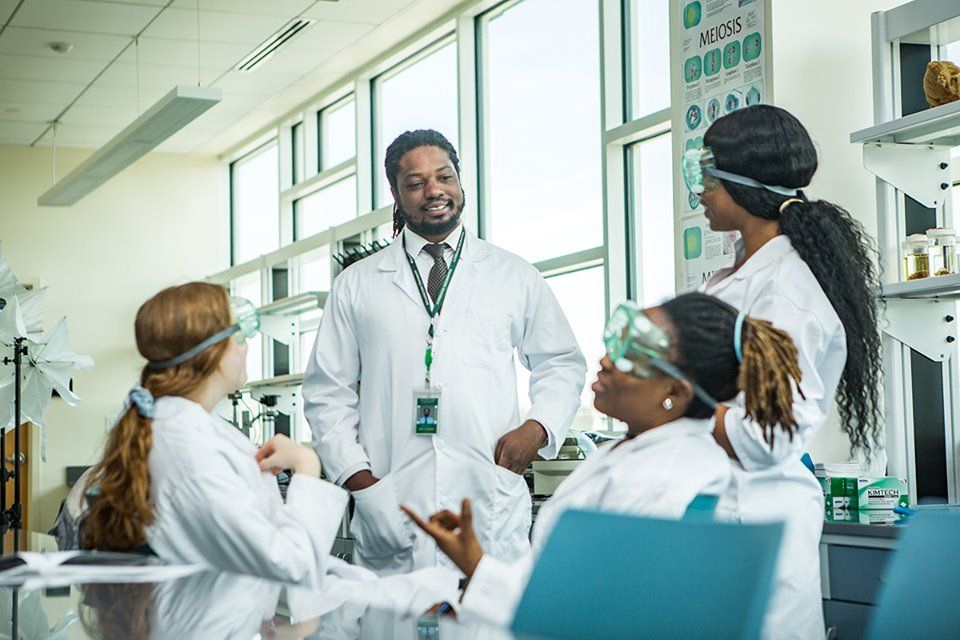Dr. Milton Muldrow
Dr. Milton Muldrow loves Delaware
Dr. Milton Muldrow
Wilmington University Chair of Science & Delaware NASA Space Grant Associate Director
Dr. Milton Muldrow was first introduced to NASA’s Space Grant Project when he was named chair of Wilmington University’s Science program six years ago. As he and his team developed science programs for WilmU, “Delaware’s Place for Earth and Space Science,” his goal was to align the university with the nationwide project through the Delaware Space Grant Consortium.
“The Space Grant’s mission is to produce the workforce of the future for NASA,” said Muldrow. “They do this through research engagement for college students, internships and fellowship programs.”
Several WilmU students who have participated in the Space Grant Consortium have gone on to make an impact in the scientific community. “We got involved to get more resources for our students,” Muldrow said. “Now, those students are doing amazing things.”
Through Muldrow’s leadership, research and involvement with NASA, science is now a top priority at WilmU. Just as important, students are continuing into various professions in science, environmental science, engineering and other related fields.
Three years after Muldrow joined WilmU’s faculty, the university had the state’s second-highest enrollment — 94 students — in an undergraduate Environmental Science program, a credit to Muldrow and his team’s efforts to open the science field to students who may not otherwise have had the opportunity.
At WilmU’s Brandywine location in North Wilmington, “we designed new, state-of-the-art laboratories,” said Muldrow. “We also gained funding from the NASA Space Grant to examine genomic engineering of corals and steered Wilmington University toward the science. This has changed the STEM landscape for Delaware as all new programs have succeeded in attracting Delaware students.” WilmU also has launched a bachelor’s degree program in Biology, which Muldrow chairs.
Before coming to Wilmington University, Muldrow worked as a biologist and program analyst for the National Science Foundation (NSF), where he helped write its first reports on climate change. His duties included making funding recommendations for research experiences for undergraduate grants, leading NSF-supported research projects in Florida involving marine invertebrate population studies and producing a climate change brochure.

Muldrow earned his Ph.D. in Environmental Science and Public Policy at George Mason University in Virginia; his Master of Science degree at the University of Missouri – St. Louis; and his Bachelor of Science degree in Biology/Environmental Science from Saint Francis University in Pennsylvania. He came to Delaware by way of Baltimore, Maryland.
“After graduate school, I did a lot of work for the federal government and National Science Foundation,” he said. “But I really wanted to get back to academia. That was always my final goal.”
While looking for opportunities in the education field, he discovered that WilmU had an open position that was perfect for him. “It was such an amazing opportunity to have some influence on a department and create new programs,” he said.
Location was a big part of the position’s appeal. “Delaware is great,” said Muldrow. “Professionally, I find it’s easy to access all types of people throughout the power structure. It’s easy to make partnerships. Delaware is a state that works together, and that’s amazing to see. You don’t find that everywhere. It’s been a great place to launch a scientific career largely because of that.”
Muldrow has delivered two TEDx Talks, including one that hit the top five in the environmental science topic. He also is recording several episodes of “The Great Courses,” a series of recorded courses available on Audible and other platforms.
“I have been working on a series for synthetic biology, which includes discussions about the modern marvels of the genetics revolution, synthetic biology and space, CRISPR and gene editing, de-extinction and xenobiology, among many other topics involving synthetic biology,” he said.
Outside his academic commitments, Muldrow is married and has four children. His family enjoys sports, traveling and visiting Delaware landmarks. “We are a pretty big sports family,” he said. This includes watching sports, both on television and in person, and participating in their favorite games. Muldrow’s two oldest sons play football, and his 11-year-old is interested in running track this year in middle school. “Both watching the game and attending in person, sports is a great way to spend quality time together,” he said.
A favorite place for the Muldrow family to visit is the Delaware Museum of National History. “My kids love the see-through floor section where they can walk on top of a coral reef,” Muldrow said. “They also love the trails outside. We’ve been going there for many years, since they were very small, and it’s a great place to spend the day together as a family.”